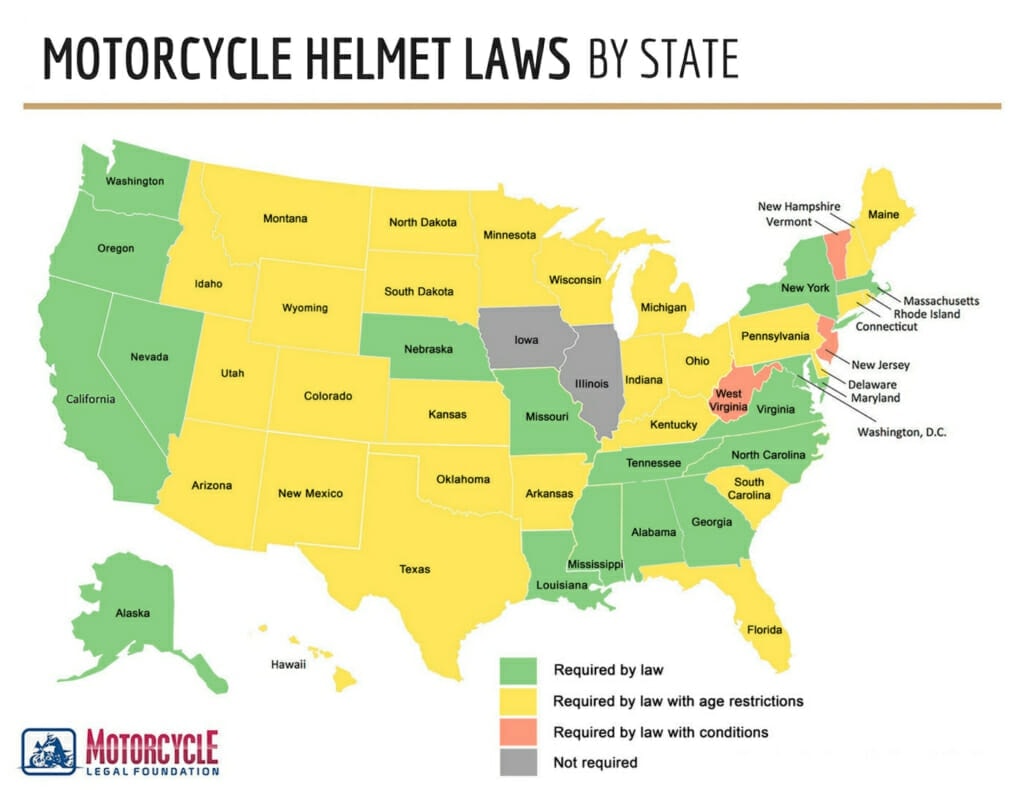Motorcycle Helmet Laws by State

Helmet Laws by State
States with Universal Helmet Laws
There are 19 states and the District of Columbia that have universal helmet laws. This means that all riders, regardless of age or experience level, are required to wear helmets while riding a motorcycle.
| State | Helmet Law |
|---|---|
| Alabama | Universal |
| California | Universal |
| Georgia | Universal |
| Louisiana | Universal |
| Maryland | Universal |
| Massachusetts | Universal |
| Michigan | Universal |
| Mississippi | Universal |
| Missouri | Universal |
| Nebraska | Universal |
| Nevada | Universal |
| New Jersey | Universal |
| New York | Universal |
| North Carolina | Universal |
| Oregon | Universal |
| Tennessee | Universal |
| Vermont | Universal |
| Virginia | Universal |
| Washington | Universal |
| West Virginia | Universal |
| District of Columbia | Universal |
States with Partial Helmet Laws
28 states have partial helmet laws. These laws require riders of certain ages to wear helmets while riding a motorcycle. The age requirements vary by state.
States with Age Requirements
The following states require riders under a certain age to wear helmets:
- Alaska: Under 18
- Arizona: Under 18
- Arkansas: Under 21
- Colorado: Under 18
- Connecticut: Under 18
- Florida: Under 21
- Hawaii: Under 18
- Idaho: Under 18
- Indiana: Under 18
- Iowa: Under 18
- Kansas: Under 18
- Maine: Under 18
- Minnesota: Under 18
- Montana: Under 18
- New Mexico: Under 18
- North Dakota: Under 18
- Ohio: Under 18
- Oklahoma: Under 18
- Pennsylvania: Under 21
- Rhode Island: Under 21
- South Carolina: Under 21
- South Dakota: Under 18
- Texas: Under 21
- Utah: Under 18
- Wisconsin: Under 18
- Wyoming: Under 18
States with Permit and/or Passenger Restrictions
The following states have helmet laws that apply to riders with a learner's permit, or to passengers:
- Delaware: Permit holders and passengers
- Illinois: Permit holders and passengers under 18
- Kentucky: Permit holders and passengers under 21
- Massachusetts: Riders with instructional permits and passengers
- Michigan: Riders with a motorcycle endorsement for less than 1 year and passengers
- New Hampshire: Riders with less than 3 years of experience or under 18, and passengers
- Oregon: Permit holders and passengers
- Washington: Permit holders and passengers under 18
States with No Helmet Laws
Only three states in the United States have no motorcycle helmet laws: Illinois, Iowa, and New Hampshire.
The Importance of Wearing a Helmet
Wearing a helmet while riding a motorcycle can greatly reduce the risk of head and brain injuries in the event of an accident. According to the National Highway Traffic Safety Administration, helmets are estimated to be 37% effective in preventing fatal injuries to motorcycle riders and 41% effective for passengers. Helmets can also protect riders from debris, bugs, and weather conditions.
The Different Types of Helmets
There are three main types of helmets: full-face, open-face, and half-helmet.
- Full-face helmets provide the most protection as they cover the entire head and face, including the chin and jaw.
- Open-face helmets cover the top and back of the head, but leave the face and chin exposed.
- Half-helmets cover only the top of the head and may not provide as much protection as full-face or open-face helmets.
Choosing the Right Helmet
When choosing a helmet, it's important to find one that fits properly and meets safety standards. Look for helmets that are Department of Transportation (DOT) certified or Snell Memorial Foundation certified. Consider the type of riding you'll be doing and the weather conditions you'll be facing. It's also important to replace your helmet after any impact or after five years of use.
Pros and Cons of Helmet Laws
Pros
- Increased safety for motorcyclists and passengers.
- Reduced medical costs associated with head injuries.
- Lower insurance costs for riders.
Cons
- Limitation of personal freedom and individual choice.
- Increased costs for riders who choose to wear helmets.
- Potential for decreased tourism in states with helmet laws.
FAQ
1. What is the penalty for not wearing a helmet while riding a motorcycle?
The penalty for not wearing a helmet while riding a motorcycle varies by state. In some states, riders can be fined or have their license suspended. In other states, riders may face no penalty at all.
2. Do helmet laws reduce motorcycle fatalities?
Studies have shown that universal helmet laws are effective in reducing motorcycle fatalities. However, partial helmet laws have been shown to be less effective.
3. Can I wear a bicycle helmet while riding a motorcycle?
While a bicycle helmet may provide some protection, it is not recommended for use while riding a motorcycle. Motorcycle helmets are designed to provide greater protection from impacts at higher speeds.
4. Can I wear a novelty helmet instead of a DOT certified helmet?
Novelty helmets are not DOT certified and do not provide adequate protection in the event of an accident. It is recommended to wear a DOT certified helmet for maximum protection.
